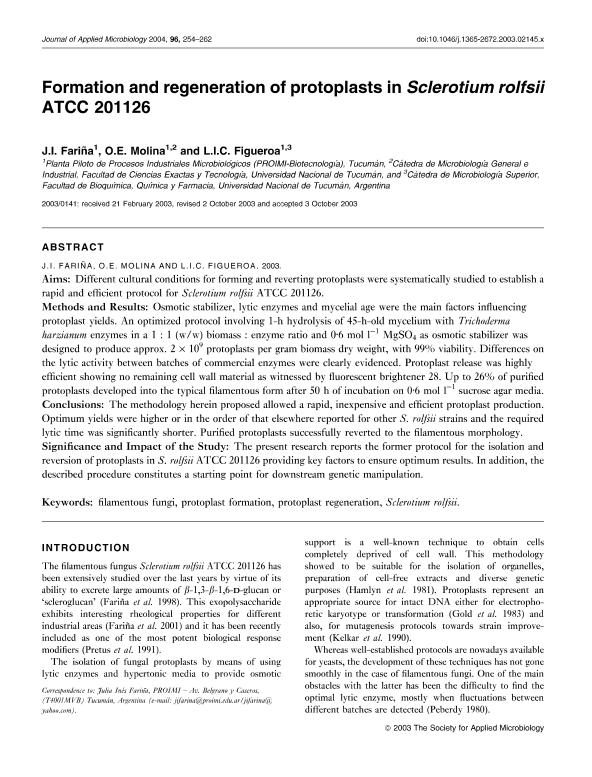Artículo
Formation and regeneration of mycelial protoplasts from Sclerotium rolfsii: A novel procedure for manipulating scleroglucan production?
Fecha de publicación:
02/2004
Editorial:
Wiley Blackwell Publishing, Inc
Revista:
Journal of Applied Microbiology
ISSN:
1364-5072
Idioma:
Inglés
Tipo de recurso:
Artículo publicado
Clasificación temática:
Resumen
Aims: Different cultural conditions for forming and reverting protoplasts were systematically studied to establish a rapid and efficient protocol for Sclerotium rolfsii ATCC 201126.
Methods and Results: Osmotic stabilizer, lytic enzymes and mycelial age were the main factors influencing protoplast yields. An optimized protocol involving 1-h hydrolysis of 45-h-old mycelium with Trichoderma harzianum enzymes in a 1:1 (w/w) biomass : enzyme ratio and 0Æ6 mol l)1 MgSO4 as osmotic stabilizer was designed to produce approx. 2x 109 protoplasts per gram biomass dry weight, with 99% viability. Differences on the lytic activity between batches of commercial enzymes were clearly evidenced. Protoplast release was highly efficient showing no remaining cell wall material as witnessed by fluorescent brightener 28. Up to 26% of purified protoplasts developed into the typical filamentous form after 50 h of incubation on 0Æ6 mol l)1 sucrose agar media.
Conclusions: The methodology herein proposed allowed a rapid, inexpensive and efficient protoplast production. Optimum yields were higher or in the order of that elsewhere reported for other S. rolfsii strains and the required lytic time was significantly shorter. Purified protoplasts successfully reverted to the filamentous morphology. Significance and Impact of the Study: The present research reports the former protocol for the isolation and reversion of protoplasts in S. rolfsii ATCC 201126 providing key factors to ensure optimum results. In addition, the described procedure constitutes a starting point for downstream genetic manipulation.
Archivos asociados
Licencia
Identificadores
Colecciones
Articulos(PROIMI)
Articulos de PLANTA PILOTO DE PROC.IND.MICROBIOLOGICOS (I)
Articulos de PLANTA PILOTO DE PROC.IND.MICROBIOLOGICOS (I)
Citación
Fariña, Julia Ines; Molina, Oscar Edberto; Castellanos, Lucia Ines; Formation and regeneration of mycelial protoplasts from Sclerotium rolfsii: A novel procedure for manipulating scleroglucan production?; Wiley Blackwell Publishing, Inc; Journal of Applied Microbiology; 96; 2; 2-2004; 254-262
Compartir
Altmétricas




